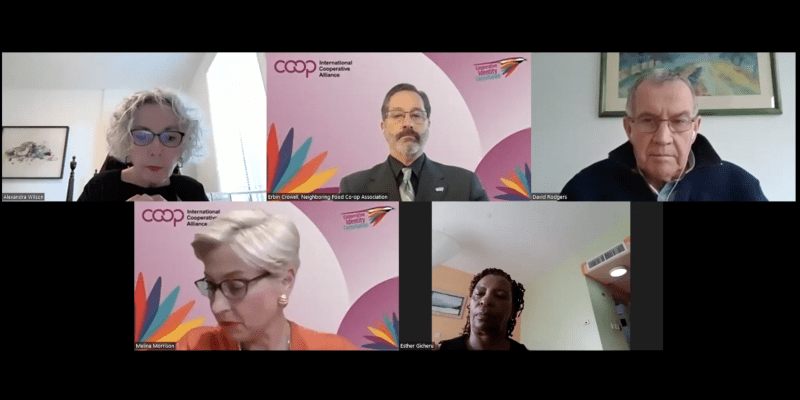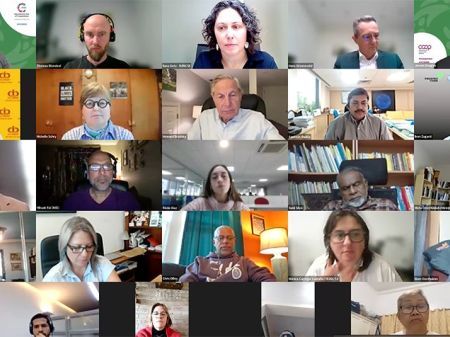
The International Cooperative Alliance presented the main findings of the Survey on the Cooperative Identity during a dedicated webinar on 14 December. More than 200 people worldwide participated in the event that could be followed in English, Spanish, French and Japanese.
Launched on 28 April, the survey aimed to gather opinions on how well the Statement about the Cooperative Identity is defined and understood.
The survey forms part of a wider Consultation on the Cooperative Identity, which intends to identify whether it remains fit for purpose and determine actions the ICA can take to refresh, deepen and protect it, explained Martin Lowery, ICA board member and chair of the ICA Identity Committee. The consultation also seeks to enhance cooperatives’ understanding of the cooperative identity and stimulate them to take actions consistent with their cooperative identity to address the problems facing today’s world.
Presenting the findings of the survey, Alexandra Wilson, the Chair of the ICA Cooperative Identity Advisory Group (CIAG), noted that it has been made available in 11 languages and three versions: one for organisations, one for individual cooperators and one for experts.
A total of 2,290 complete responses from 136 countries were received (42% from the Americas, 26% from Asia-Pacific, 19% from Europe and 13% from Africa). Of these, 622 came from organisations, 951 from individuals and 717 from experts.
Key survey findings
The survey found that there is strong but not universal familiarity with the foundational cooperative identity documents. Respondents are more familiar with the principles than the statement as a whole with even fewer respondents familiar with the ICA Guidance Notes on the Cooperative Principles. While respondents confirmed the importance of all principles, they named principle two of Democratic Member Control as the most important for their cooperatives.
The survey comments expressed three main views regarding the principles. Some respondents saw them as an indivisible whole, some said they should be updated and others said that they should not be changed.
With regards to the Statement on the Cooperative identity, most respondents agreed that it has an impact on their cooperatives and that it is relevant in expressing the distinct purpose and nature of cooperatives and in capturing cooperatives’ responsibility to society at large and to future generations.
Another issue which respondents had different views with regards to cooperatives losing ground to other actors. The majority of respondents strongly disagreed with this view apart from expert respondents. Despite these opposing views, the majority of respondents said they believed that the Statement had not been promoted sufficiently.
Hyungsik Eum, the ICA Director of Research explained that opinions also varied from country to country. For example, Nigeria, the Philippines, Korea, Argentina and Finland disagree with the claim that cooperatives are losing ground, while the USA, Canada, Australia, the UK, Mexico, Italy and Japan expressed strong concerns regarding cooperatives losing ground to other actors.
In terms of the relevance of the Statement on the Cooperative Identity, three main views were expressed: some respondents said the Identity Statement works well as an ideal and in reality; others argued that the Identity works well as an ideal but there is a gap between this and the reality on the ground; and others argued the statement is not effective in itself and may not work well in practice.
Asked what should be done going forward, respondents expressed four different views: that the current Statement is good enough; that the current Statement needs to be updated to strengthen cooperatives’ contribution to addressing societal problems and the environmental crisis; that a more balanced approach is needed to fulfil the original mission of cooperatives and that the Statement is hypocritical.
The findings presentation was followed by a panel discussion featuring cooperative leaders from around the world.
During the session Erbin Crowell, Executive Director of the Neighboring Food Co-op Association in the USA, highlighted the need for cooperative education to engage members, staff, policymakers and activists in the identity and help them understand how it is articulated. He also brought forth his concerns with cooperative laws that did not translate well the cooperative identity in his opinion, and gave the example of the Limited Cooperative Association Act in the United States which gave voting rights to non-user investor “members”.
“Looking at the history of our movement and how it has evolved in responding to change is a very good roadmap for us to think about the future,” he added.
He believes there is a need for laws that specifically state that if a business is not incorporated as a cooperative, it should not market itself as cooperative.
“I think that's probably the most urgent challenge to the cooperative identity because it has the potential to fundamentally change what it means to be a cooperative,” he said.
Melina Morrission, the CEO of the Business Council of Cooperatives and Mutuals (BCCM) in Australia argued that the Identity Statement speaks to the current global challenges but cooperatives must do more to raise awareness about it.
“We are the original Environmental, Social and Corporate Governance (ESG) businesses, hand on heart we can say that. So our job is actually to bring those principles to life through clear, consistent communication,” she said.
Esther Gicheru, Director, Institute of Co-operative Development (ICD) at the Cooperative University of Kenya, pointed out that it was important for cooperatives to balance the social and economic aspects of their business model. She argued that since the word enterprise was introduced in Kenya, the cooperative model has been adopted. “It’s important to emphasise the business aspect for people to understand they can support themselves through cooperatives,” she said, adding that focusing on simply chasing profit can also lead cooperatives on the wrong route.
David Rodgers, former President of Cooperative Housing International who served as the interpretative editor of the ICA Guidance notes on the Cooperative Principles, explained that the concept of environment and sustainable development in the current Identity Statement is implicit, rather than explicit, but that the Guidance Notes on the Cooperative Identity provide a more in-depth explanation of how the this can be understood.
“If you were to write the statement of identity today, you would make it (sustainable development) explicit, but I think you need to recognise that there are inherent difficulties in amending the Statement of Identity and the cooperative principles and values because you know they are written into international law,” he said.
The webinar concluded with an overview of what comes next for in terms of the Cooperative Identity Consultation process. In addition to examining the findings of the survey, the ICA will collect and review existing materials of the cooperative identity, animate a discussion forum and run educational webinars and virtual consultation sessions in 2023. The Cooperative Identity Advisory Group will then make deliberations and suggest recommendations to the ICA Board, which will be followed by a debate at one or two ICA General Assemblies in 2024 and /or 2025.
A written report sharing the main findings of the survey will be published at the beginning 2023.
Watch the full webinar in English, Spanish, French and Japanese:
EN > https://youtu.be/Bb9F1Ew2-Gg
ES > https://youtu.be/kD3F9MaazP8



